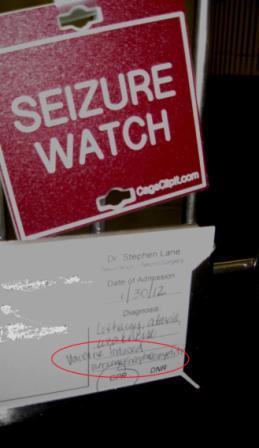Adverse Vaccine Reaction FAQ, Part 3
Here is part three (of five) of frequently asked questions dog lovers have asked me since Lilly’s ill-fated response to a vaccine earlier this year. This series of questions / answers covers the symptoms, diagnosis, and Lilly’s prognosis of Lilly’s vaccine-induced meningoencephalomyelitis / meningoencephalitis (inflammation of the brain and lining of the brain and spinal cord).
Please note: These questions and answers were posted when it still looked like Lilly might survive. That was not ultimately the case. Lilly died on December 17, 2013. We lost the fight, after spending 23 months and nearly $31,000 trying to save her.
How did Lilly’s adverse vaccine reaction develop?
Lilly fell ill within 12 hours of receiving the vaccine on January 23, 2012, with lethargy and injection site swelling. Keep in mind that wasn’t unusual for Lilly, so we continued giving her Benadryl and assumed she would recover as she always had. She did receive preventive steroids at the time of vaccination.
However, Lilly worsened over several days and developed:
- Severe lethargy
- Fever
- Increasing ataxia (wobbly walking)
- Cognitive delay
- Vision impairment
I’d say Lilly was about 20% of her normal self when we took her to the ER.
I took her to the nearest 24-hour veterinary emergency hospital Sunday, January 29, 2012. Lilly was hospitalized Monday, January 30, 2012, at the nearest veterinary specialty hospital with a board-certified veterinary neurologist / neurosurgeon.
Lilly spent the next seven days receiving round-the-clock treatment. Despite that aggressive intervention, Lilly began having seizures Thursday, February 2, 2012, while still hospitalized.
In the weeks the followed, Lilly developed numerous additional problems relating to the vaccine-induced meningoencephalomyelitis and side-effects of treatment, including:
- Vomiting
- Hypertension (high blood pressure)
- Epistaxis (nose bleeds)
- Severe diarrhea
Lilly required another veterinary emergency visit for severe nose bleeds Friday, February 10, 2012.
Lilly suffered a significant relapse, starting April 4, 2012, with lethargy and ataxia, but she has bounced back after the board-certified veterinary neurologist / neurosurgeon adjusted her medications.
How was Lilly diagnosed with vaccine-induced meningoencephalomyelitis?
Based on clinical neurological examination on Monday, January 30, 2012, and lots of blood work as well as an MRI and spinal tap done Tuesday, January 31, 2012, the board-certified veterinary neurologist / neurosurgeon ruled out all other possible causes of Lilly’s sudden illness, including:
- Toxins
- Bacterial infections
- Viral infections
- Parasitic infections
- IMHA (immune-mediated hemolytic anemia) – a destruction of red blood cells, where most dogs survive just 2-3 weeks from onset.
- GME (granulomatous meningoencephalomyelitis) – a severe and often irreversible form of nervous system inflammation.
- Structural lesions in the brain or spinal cord – essentially nervous system cancer or nervous system injury
The final diagnosis was vaccine-induced meningoencephalomyelitis.
We know from the MRI results that Lilly has significant inflammation in these parts of her nervous system:
- Upper cervical spinal cord (her neck)
- Cerebellum (back of her brain – controls coordination / balance)
- Brain stem (oldest part of the brain, evolutionarily speaking – transfers signals from the brain down the spinal cord and affects all sorts of fundamental body processes)
- Occipital cortex (toward the back of the brain – also sometimes called the visual cortex)
This kind of inflammation is known as “multifocal,” meaning it isn’t just affecting one spot. That’s important because most “idiopathic” neurological problems – meaning veterinarians really don’t know why it happened – typically have just one symptom. So, the fact that Lilly had multifocal trouble AND other symptoms (lethargy, fever, etc.) played an important part in her diagnosis. There is a reason this happened. That reason was Lilly’s body having an extreme hyper-immune response to the vaccine.
What is Lilly’s prognosis?
Our veterinary neurologist believes that Lilly will recover to 90-95% of normal.
When I am too optimistic, the veterinary neurologist says, “We’re getting there.” When I’m too pessimistic, he says, “We’re still OK.”
When we joked once about how much I’m writing about what happened to Lilly and how some people have responded, he teased me and said, “Don’t go pissing anyone off.”
I still worry Lilly might “crash” and die from this (because we know a dog in a similar situation who died recently). I still see many cognitive and neurological deficits. We haven’t seen any major gains in her recovery for weeks, but Lilly did indeed survive and has improved greatly. At her worst, Lilly was 20% of her normal self. Today, I’d say she is around 80% of her normal self.
This early video shows how hard it was for Lilly simply to hold her head up.
***
If you are new to our story, feel free to use the blog post category pull-down menu in the sidebar or this Adverse Vaccine Reaction category link to access all the posts we’ve published since Lilly got very, very sick with meningoencephalomyelitis (inflammation of the brain and lining of the brain and spinal cord) after an adverse reaction to a rabies vaccine given January 23, 2012. We’re working VERY hard to help her fully recover from both her cognitive and neurological deficits.
***
If you want to access all 5 blog Adverse Vaccine Reaction FAQ blog posts, please use these links:
FAQ Part 1 – Lilly’s health status and vaccine history.
FAQ Part 3 – Symptoms, diagnosis, and Lilly’s prognosis

